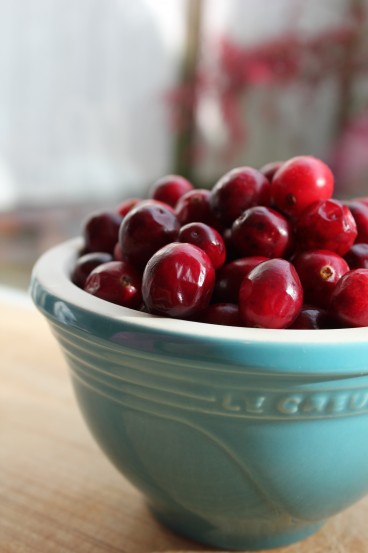Cranberry (Vaccinium macrocarpon)
cranberries are great for preventing urinary tract infections


I still remember when my interstitial cystitis symptoms came to a head. I had been noticing ongoing bladder pain after I drank coffee for several months, but this time, it felt like I had a terrible urinary tract infection. So I did what every herbal wanna-be would do. I drank Vaccinium macrocarpon juice, which is the juice of the cranberry fruit. I drank as much as I could swallow.
The pain got worse. Way worse. And, well, I didn’t have a urinary tract infection. I had interstitial cystitis. The cranberry juice was like kerosene being poured on a fire in my bladder (cranberries can aggravate interstitial cystitis symptoms).
I bring this story up because cranberries have played a large role in folk medicine, particularly for the treatment of a urinary tract infection. Folk medicine has taught many people that the acidity of the cranberries kills the bacteria causing the urinary tract infection.
Well, sorry to burst your cranberries, but it doesn’t work that way. Cranberries do not directly kill bacteria in your urinary tract and they are not the go-to herb when it comes to treating urinary tract infections naturally. There are more potent herbs that can kill the bacteria, but that’s for another herb of the month.
Cranberries can acidify the urine, but for this to happen you would need to drink more than 32 ounces of cranberry juice in one sitting, and the acidity would last for maybe 10-15 minutes.1
Cranberries contain a mega antioxidant, like many other dark berries, called proanthocyanidins. These special antioxidants are wonderful for cardiovascular health, but in terms of a UTI, they inhibit the binding of E. coli (and other bacteria) to the bladder wall. In other words, cranberries make it harder for bacteria to congregate and make offspring in your urinary tract. Because of this quality, cranberries are a great choice for preventing urinary tract infections. They are not the go-to herb for these types of infections because they have not been shown to directly kill the bacteria. However, studies have still shown them effective in treating urinary tract infections, but this is at a very high dose of cranberry juice.
If you choose to use cranberry juice therapeutically, make sure to get the straight-up stuff without all the extra sugar or fruit juices. Excess sugar is pro-inflammatory and not the best thing for your body to process when it’s fighting an infection. If other non-cranberry juices are added, the benefits of the cranberries get diluted. Plus, you don’t want to give yourself another problem down the road from the ingestion of too much (sweetened) cranberry juice! I get my cranberry juice concentrate from Trader Joe’s. For each glass I drink, I add about 40% water and a few drops of liquid stevia. It’s delicious this way, and there are no additional sugars added.
You can also use a cranberry juice supplement if you can’t handle the tartness of the juice (or the gobs of it that you need to drink). Genestra makes a supplement called Cranberry Plus, which I have personally used before. If you absolutely can’t stand the sight of cranberries, you can try blueberries instead. Because of their mutual friend, proanthocyanidins, blueberries are interchangeable with cranberries.
What’s your experience with using cranberries?
Resources:
1. Yarnell, Eric. Naturopathic Urology and Men’s Health. Wenatchee, WA: Healing Mountain Publishing, 2001.
Enjoy More Archerfriendliness
I had gum graft surgery this past March. I had put the surgery off for two years, due to the multiple inconveniences (although I wish I hadn't avoided it for so long). The biggest inconvenience fo...
I've been prescribing this tea for my patients and I recently tested it on myself. It works, and it works well! I'm tempted to give you a disclaimer for it being so...simple. There are a whole bu...
The past year has been really, really hard for me. It has been harder than I expected it to be, and harder than I can admit online or in person. Some of the things that have made it so hard are th...








Kelsey
March 26th, 2015 at 8:40 am
As somebody who’s had chronic UTI’s since age 4, I’d love to read a post about other herbs that can help! I’m pretty good in general at nipping a UTI in the bud when I notice one starting to come on…..but I still get them sometimes. The thyme essential oil in water trick does work wonders…..but it tastes terrible! So if there are any other herbs then that would be awesome to learn about! Haha. :)
Reply